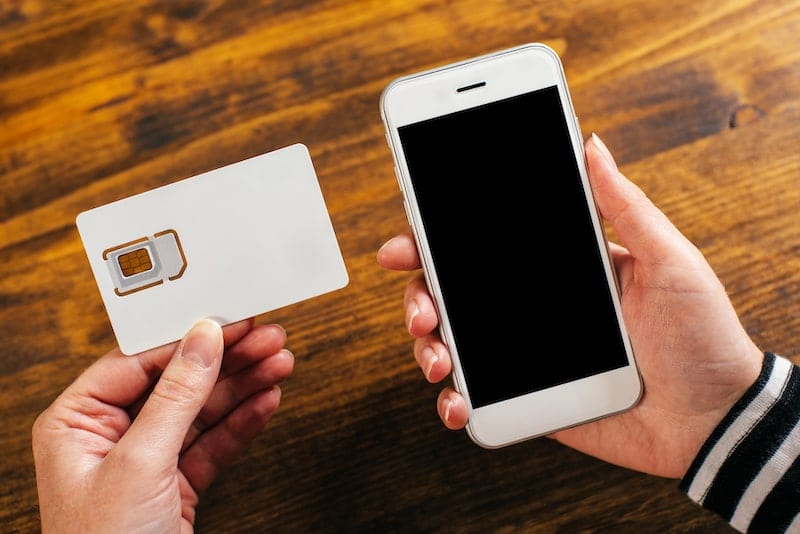No products in the cart.
March 11
Guide to Getting a Cell Phone in Japan: Everything You Need To Know
0 comments
March 11
0 comments
Between choosing a service provider, getting the right sim card for your phone, and understanding your contract, getting a cell phone in Japan can be challenging for newcomers! Never mind the fact that it's usually one of the first things you'll be doing – especially as a student.
Whether your intent is to study in Japan just for a set amount of time, or you want to stay afterwards and work, you should focus on getting the best deal you can. This guide walks you through everything you need to know about getting your mobile service set up in Japan so you can stay connected without breaking the bank!

Before we even look at the different options for service plans, you should know whether or not your phone from your home country will work in Japan.
It used to be that most foreign phones wouldn't work in Japan. But in 2021, the situation has mostly been resolved, and with a few exceptions, the answer is that yes, you can use your foreign phone in Japan (though some features might not work properly).
To be able to use your foreign cell phone in Japan, you need to make sure it is unlocked. This doesn't mean you swiped up on the lock screen! It means that the phone is not locked into the network of just one service provider and will work with other networks.
Before you come to Japan, you should contact your service provider and ask them to unlock your phone. Some countries don't allow providers to lock phones, but if you're from America, Canada, or the UK, odds are your phone was locked when you purchased it. Your service provider may charge a service fee to unlock your phone, but it should be a simple request.
If you're from the UK and planning to move to Japan, you may be in luck! The national regulator is banning mobile networks from selling locked phones from Dec. 2021 onwards. Be sure to check if your phone is affected by this change.

If you have an unlocked cell phone, you can get service from most service providers in Japan, but you should consider taking advantage of the low cost plans from providers, called MVNOs (Mobile Virtual Network Operators). They use the network of larger providers and pass their infrastructure savings on to you – the consumer.
They are able to offer data only or data & voice plans depending on your needs. Compared to the main three service providers in Japan (SoftBank, NTT DoCoMo, au by KDDI), they are cheaper and you can exit the contracts with little or no penalty.
Anybody who has ever been held in a choke-hold by SoftBank will attest that these friendly newcomers to the Japanese mobile market are welcomed with open arms.
You can generally sign up online and receive a Japanese SIM card and phone number in a day or two (yes, Japan has a great courier system!) or pick up upon arrival at the airport, depending on the provider. One exception is LINE Mobile, which requires you to have a Japanese ID and Japanese credit card in your name.
If you're thinking about your cost of living in Japan and how to afford your time in the country, you should check out our 2 planning tools to help estimate costs and forecast your finances for however long you expect to be in Japan.
The following table outlines some of the most popular data and voice SIM providers in Japan. Pricing info is the monthly cost, before tax.
In the list above, some of the companies offer the option of going "data only" and getting a SIM that does not include a phone number. Yes, you can do this, but it will make life infinitely more difficult, as you need a phone number to sign up for so many services in Japan.
Do yourself a favor and throw down the extra fee to include voice as part of your plan, and get a phone number.
Let's say you don't want to use your phone from your home country, and you would rather get a new phone in Japan. Perhaps you want to finance the phone (get it for "¥0 down") as part of your monthly bill.
You can go to a home electronics store like Yodobashi Camera, Bic Camera, or Yamada Denki and buy a cell phone outright (unlocked), and then use one of the aforementioned MVNO providers.
If you want to finance your phone as part of your monthly bill, where you pay a low up-front price (or nothing) for your new phone on day you get it, you can walk into any of the "Big 3" providers and sign up with them. The Big 3 mobile providers in Japan are:
This is where people run into issues sometimes. It can be a bit of a chicken & egg situation between getting a bank account set up and getting your cell phone. Japanese banks will generally require you to have a Japanese phone number to sign up and create an account, and cell phone companies will generally require you to have a bank account to sign up and get a number.
To overcome this, use a friend's or acquaintance's phone number to sign up for a bank account, and then go change it later. Yes, it's dumb. Yes, it works.
This is where it can be a bit tricky. Depending on which branch of which company you go to, and who you talk to that day, they may be more or less strict on the requirements listed above.
Sometimes you don't need a credit card, but sometimes they want to have one on file. And really, you shouldn't need a passport as all your pertinent details are captured on your residence card.
Unfortunately, systems have changed over the years, and some staff prefer an abundance of evidence that you aren't a fly-by-night crook that will run away with your shiny new phone and not pay.
If you bring the above documents to a cell phone shop and they turn you down (it happens), you can try another branch and you may have different results.
Please note: Based on our own experiences, and those of many students and other newcomers to Japan, we do not recommend signing up with one of the following providers. Yes, you can finance a new phone over the course of your contract, but there are many potential penalties.
SoftBank has a rotating cast of cute white dogs as their mascot, DoCoMo has the much beloved Poinco Brothers, and au has the least offensive website experience of the three. Besides that, there's not much to differentiate them, so let's look at how the contract experience works with these providers.
Generally speaking, when you go with one of these companies, you'll be signing up for a 2 year contract, with steep penalties to get out or switch. In return you get a "full service" experience, where you can walk into a branch and have your issue dealt with by a person, instead of having to phone into a service queue.
As a side note, Y! Mobile paints itself as an MVNO, but it's just SoftBank by another name. Don't be fooled.
There's not really much to complain about here. Besides the sometimes obscure requirements that various branches will impose on foreign residents we spoke about before, basically you are paying more money for a higher level of hand holding.
The staff will be polite, attentive, and they know their campaigns. There is a huge network of support behind these frontline staff, should you have any questions.
Typically, within about an hour, you should be able to walk in from the street and sign a contract, leaving with a brand new phone in your pocket.
The cost of your phone (unless you choose to pay up front – but then, why are you using one of the Big 3 for a contract?) will be built into your monthly billing. Older phones are cheaper, newer phones are more expensive; this should be very similar to your home country.
Be aware, if you go to a home electronics store, like Yodobashi Camera, and walk through their phones section, you can typically cross shop all 3 major carriers without having to hop around between branches. There will be staff onsite to get you signed up.
Here's where the frustration can begin.
You'll be paying anywhere from ¥3,900 for a 5GB plan (no phone included) to over ¥10,000 for a more full featured plan. One of the watch-outs here is they will lure you in with a "discounted" initial 6 months or year, and then your price will jump drastically after that.
The good news is that because they are such large companies, you can phone them any day of the week to complain and someone will listen to your claim politely before telling you it's what you signed up for. So that's a nice feature.
This is where it gets really fun with these companies.
Because you have ostensibly signed a 2 year contract with them, they can impose seemingly unfair cancellation policies and fees on you when you're ready to move on.
Cancellation fees of over ¥20,000 are not unheard of. Also, you will need to pay for your device in full if you were financing it as part of the deal.
There is no lenience or leeway for 10+ year customer loyalty, so don't count on any favors when you're ready to leave. The smiling associate behind the counter is no longer your ally, the moment he or she hears you are looking to cancel.

It used to be that you had to pay for even your cell phone bill in cash, by taking a monthly statement to a convenience store and paying the cashier.
You can still do this with many providers, both Big 3 and MVNO, but not all. You will have to check with the company at sign-up about payment options, because they change frequently and you don't want to be left without a way to pay your bill!
Generally speaking, however you make your first payment to initiate the contract should be acceptable for monthly billing payments – if you paid by credit card to start your service, you'll be able to use the same card to pay your bill.
However, it's worth noting that not all carriers in Japan accept foreign credit cards. Many will only accept a Japanese credit card with your name on it. Getting a Japanese credit card without a long-term plan in Japan and full time work can be a real issue.
The following list is not extensive, but if you're new to reading contracts in Japanese, it's worth knowing at least a few words before you start signing papers.
Japanese | English |
|---|---|
データ | Data |
通話料金(つうわりょうきん) | Voice call fees |
回線(かいせん) | Line (phone line) |
使い放題(つかいほうだい) | Unlimited use |
月額料金(げつがくりょうきん) | Monthly fee |
基本データ容量(きほんでーたようりょう) | Basic data allowance |
最大(さいだい) | Maximum |
契約(けいやく) | Contract |
解約(かいやく) | Contract cancellation |
If you're coming to Japan as a student, you're much better off either bringing your own phone (unlocked, of course), or buying a new phone outright in Japan and not trying to finance it through one of the Big 3 carriers.
This way, you can take advantage of the low monthly fees of the MVNOs and also avoid a hefty cancellation fee if you leave Japan before the 2 year contract is up.
If you have longer-term aspirations in Japan, you don't mind paying a higher fee for service, and you like being able to walk into a branch in almost any neighborhood, then you can consider going with a major carrier.
Did you like this article? Please share it around!
Tags
Get info about schools, deadlines, and opportunities, straight to your inbox.
Session expired
Please log in again. The login page will open in a new tab. After logging in you can close it and return to this page.